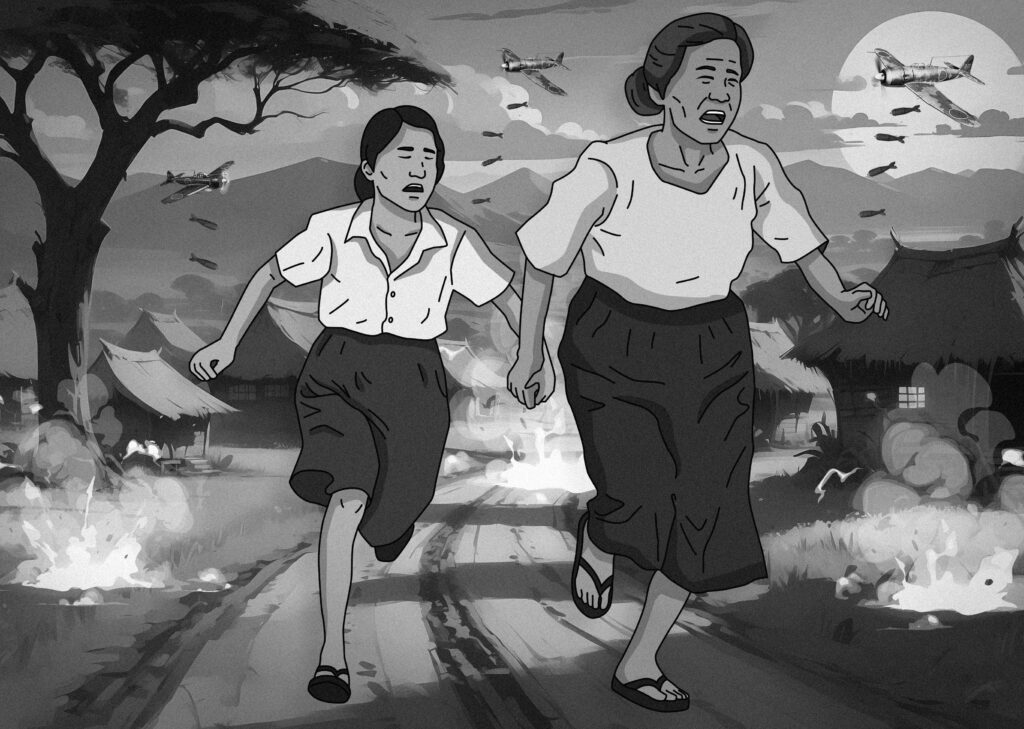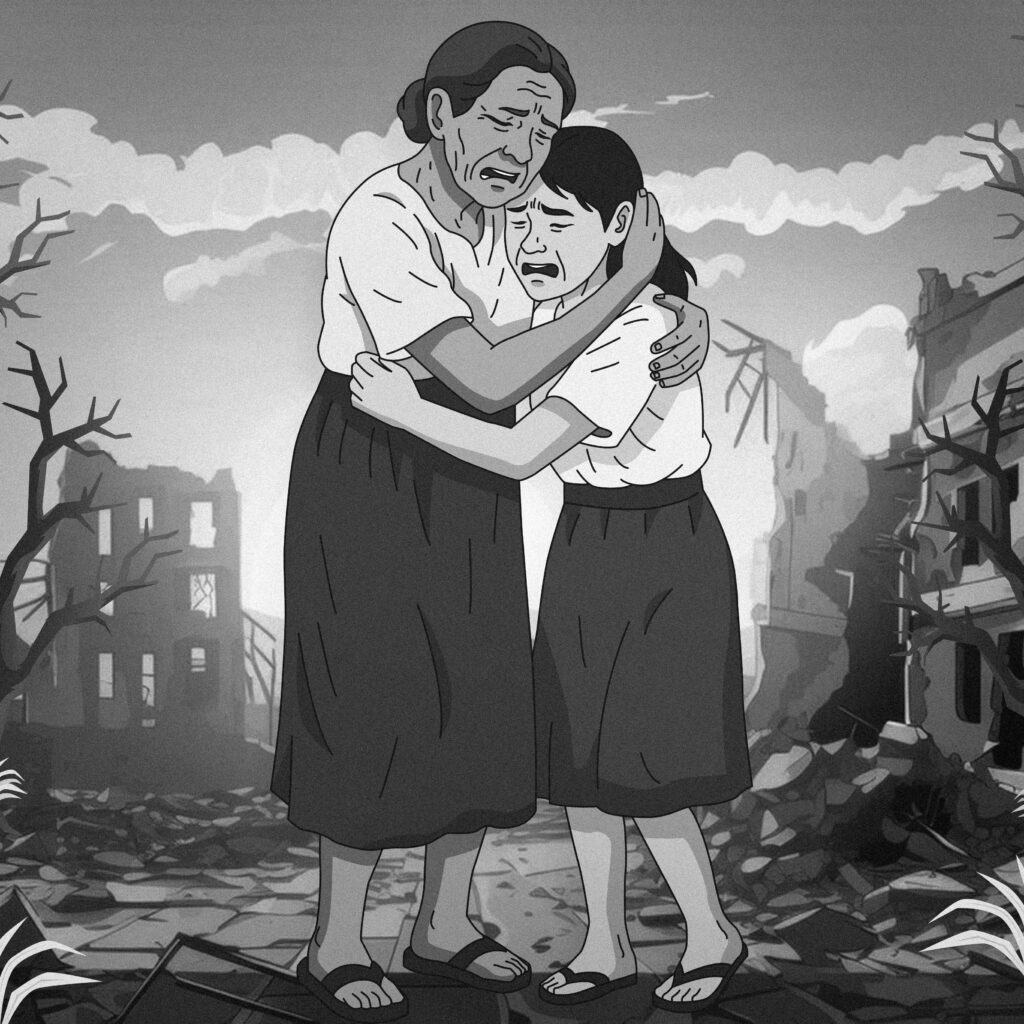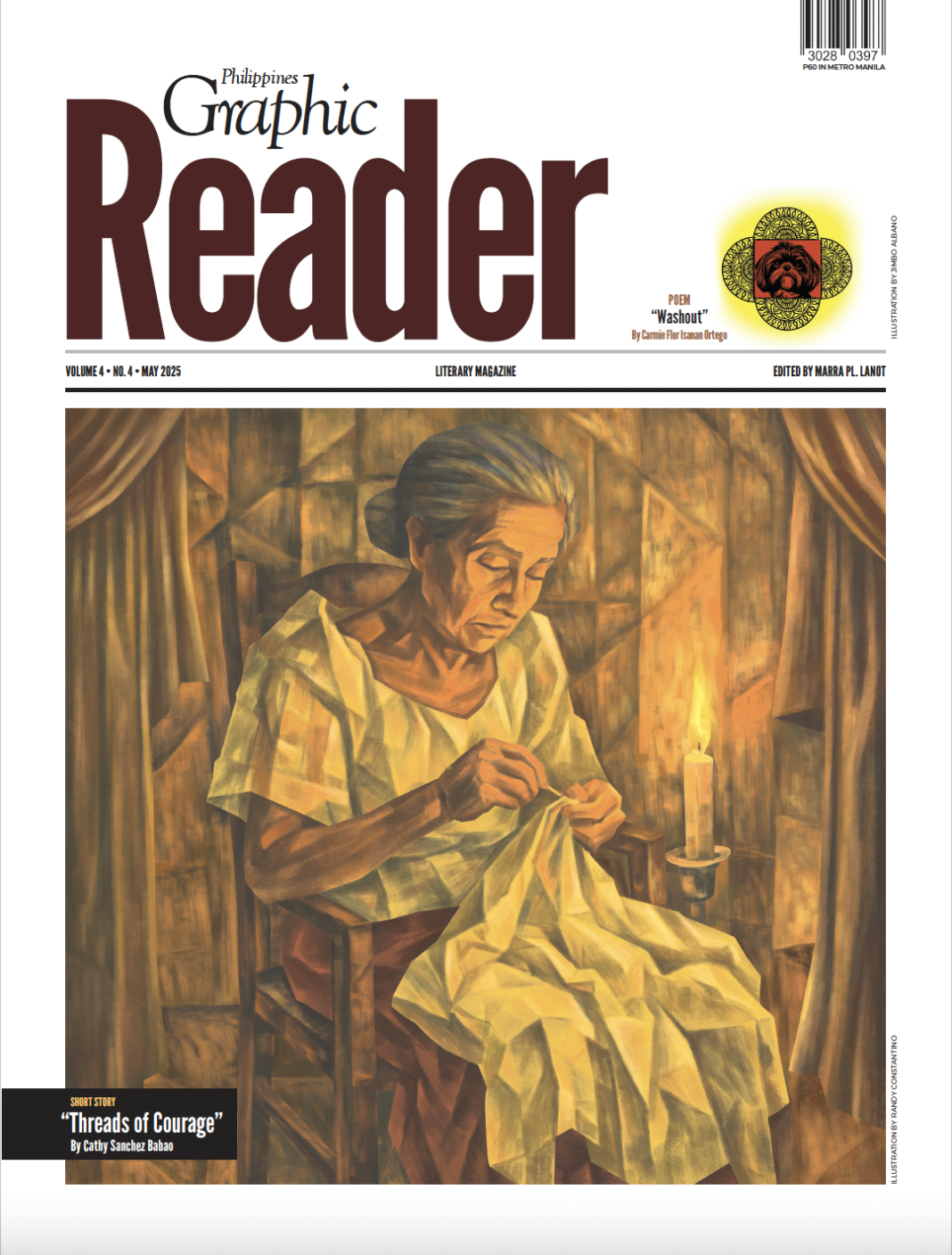The night the war reached Cebu, Maria woke to the sound of distant explosions. It was April 1942 and she had just turned fourteen years old. Maria had known fear before—of the dark, of illness, of school exams—but this was different. The air was thick and suffocating, pressing against her chest as she clutched her mother’s hand beneath the woven blanket they shared. Outside their small house near Colon Street, there was shouting. A baby cried. Then the marching began—measured, heavy footsteps that thudded through the night like a grim heartbeat.
“Maria, listen to me,” Althea whispered, pulling her close. “Stay by my side. No matter what happens.”
Maria nodded, her eyes wide with confusion and dread. Her mother’s voice, always steady, held a new weight that frightened her more than the noise outside.
By dawn, the streets were crawling with Japanese soldiers. They moved with chilling precision—taking over government offices, tearing down flags, and hanging up banners with foreign script. The local radio stations went silent. The newspapers stopped printing. Rumors bloomed like bruises: priests arrested, community leaders missing, men dragged into the street and beaten for refusing to bow.
Maria watched the world shrink. School was closed indefinitely. The markets—once loud with vendors shouting over each other—grew quiet as goods disappeared. People walked quickly with their eyes down. Laughter vanished.
Althea, once a respected seamstress, now worked mostly at night. She stitched silently, candlelight dancing on her face. Maria noticed that her mother no longer made patterns with flowers or vines. The embroidery was precise and strange. She didn’t ask—not at first.
But one evening, she couldn’t stay silent. “Mama…what are you sewing?”
Althea looked up, needle paused mid-air. “Things that matter,” she replied softly. “Words we cannot say aloud.”
That night, Althea told her daughter everything: that the patterns were messages, encoded and stitched into seams for guerrilla couriers to deliver. Routes to safe houses. Warnings about raids. Orders from the underground.
“You’re not just making dresses…” Maria murmured.
“No,” Althea said. “I’m making hope.”
From then on, Maria helped. She held thread, watched the candle, and sometimes—when her hands stopped shaking—stitched a single line herself. Each dress that left their home was both a risk and a prayer.
But war has a way of finding even the most careful.
One night, Althea returned from the market, breathless. “We have to leave,” she said, wrapping food in cloth. “Someone was watching. It’s not safe anymore.”
“Where will we go?”
“Your uncle Felipe has a home in Ormoc, he will take us there tomorrow.”
The decision was final. Maria packed quietly, her hands moving while her heart thundered.
Chapter 2: Escape to Ormoc (March 1944)

They left before dawn in a small banca, crossing the Camotes Sea under a sky still wearing its stars. Maria shivered, not just from the cold, but from fear so large it felt like the ocean itself.
The boat rocked gently until it didn’t.
Gunfire erupted from the shore.
“Down!” someone hissed.
A bullet splintered the side of Uncle Felipe’s boat. He shouted—a sound swallowed by the sea—as he and another man jumped overboard.
“Uncle!” Maria screamed, reaching over the edge, but there was only darkness and water and panic.
They pushed forward. The boat groaned under its weight and fear. Maria clutched her mother’s hand as if it were the only thing keeping her tethered to the earth.
When they finally reached Ormoc, it was not safety that greeted them, but silence. The Japanese patrolled here, too—though the mountains held hope. Guerrilla fighters moved through the shadows, and whispers of American landings reached their ears like forbidden music.
Uncle Felipe never arrived. Days turned into weeks. Then into silence.
Maria and Althea stayed with distant relatives, among them Andres—Maria’s older cousin, tall and solemn, with dirt under his nails and quiet fire in his eyes.
He told her stories by candlelight: ambushes in the hills, smuggling food through rain-drenched paths, messages hidden in tin cans.
“Why do you do it?” Maria asked one night.
Andres shrugged. “Because we have to. Because they think they can silence us.” Then he looked at her. “But you know that, don’t you?”
One evening, he pressed a folded paper into her hands.
“This needs to get to the mountains,” he whispered. “The commander’s camp.”
Maria’s fingers trembled. “Why me?”
“They won’t suspect a girl.”
She hid the map in her waistband. Her steps were light but her heart heavy as she slipped past a checkpoint, through banana groves and tall grasses. The jungle swallowed her, but she kept going.
When she arrived, the guerrilla commander stared at her with a hard, assessing gaze.
“You brought this yourself?”
Maria nodded.
He softened, just slightly. “You’re braver than most men I know.”
She didn’t feel brave. She felt tired. But the commander’s words settled into her bones like warmth.
Chapter 3: Lost and Found (October–December 1944)
October came with lightning and blood.
On the twentieth, the sky above Leyte cracked open. General MacArthur returned—just as he had promised—but not with quiet deliverance. He came with warships, fighter planes, and thunder that split the heavens. The Battle of Leyte Gulf roared to life, the largest naval clash the Pacific had ever seen.
For the Japanese, retreat was not an option. For the civilians, escape was a prayer whispered between shell bursts.
Ormoc, once their precarious refuge, turned into a death trap. Artillery echoed through the mountains like the gods were tearing open the land. Planes howled overhead, and the sea turned slick with oil and fire. People scrambled for cover, clutching children, food, and photographs—the last tokens of life before it all unraveled.
One night, as the guerrillas began evacuating civilians deeper into the mountains, the crowd surged with fear. Chaos bloomed. Gunfire in the distance pushed everyone forward like a wave.
“Go! Now!” someone barked.
Maria felt her hand torn from her mother’s grip. She was shoved into a cart, her small frame pressed between sacks of cassava and trembling limbs. She turned back—just in time to see Althea pulled in the opposite direction, her face pale with alarm, eyes scanning for her daughter.
“Mama!” Maria screamed, reaching out. “Mama!”
But the sound was swallowed by shouting, marching, and the groan of wooden wheels grinding against the earth.
And just like that, she was gone.
The next three weeks cracked something deep inside Maria.
She lived in the refugee camps strung along the hills—makeshift tents of banana leaves and broken bamboo. The air smelled of soot, sweat, and unwashed fear. Nights were the hardest. The jungle rustled with ghosts, and the cold crept into her bones. There was never enough food. Rice, if any, came in handfuls. Children cried for milk. Some stopped crying all together.
Maria stayed with an old widow named Inday Pilar, who took her in with quiet kindness. They slept on a flattened mat, sharing a single threadbare blanket.
Each morning, Maria would wake before the sun and begin her search again.
She wandered from camp to camp, calling out her mother’s name, showing strangers a charcoal sketch she’d drawn from memory—Althea’s soft eyes, the bun always pinned low on her neck. “Have you seen her?” she’d ask, voice cracking. “Please, her name is Althea.”
Most people shook their heads. A few nodded in sympathy, but no one had seen her.
Days turned into nights and back again.
In the quiet moments between meals and fear, Maria would pull at the hem of her dress and trace the hidden stitching her mother once made—tight, neat loops in pale blue thread. Codes disguised as art. Her mother’s hands had done that. Hands that mended holes and stitched courage into cloth.
At night, curled beside Inday Pilar, Maria remembered how her mother’s hands would brush her hair, how she would hum as she folded clothes—an old Visayan lullaby that made everything feel safe. She remembered the scent of her mother’s skin: bay leaves and candle wax, the warm musk of camphor.
“Strength isn’t loud, Maria,” Althea had told her once, long before the sea crossing and the battles. “Sometimes, it’s as quiet as a needle pulling thread.”
She clung to that memory, repeating it like prayer.
Strength is quiet. Strength is quiet.
Even as grief gnawed at the edges of her hope, Maria refused to believe her mother was gone. Her love for her mother was a light that refused to go out, even when the world seemed entirely made of shadows.
Then, on the twenty-third day, something shifted.
It was early morning. The sky had turned the color of cold stone. Dew clung to the grass, and a thin fog curled through the trees. Maria was helping Inday Pilar gather firewood when she heard it—a voice, faint at first, then clearer.
“Maria!”
She froze. The firewood slipped from her arms.
“Maria!”
Her breath caught.
She turned.
There, at the edge of the clearing, stood a figure—thin, stooped slightly from exhaustion, wrapped in a shawl streaked with mud and ash. Her hair was pulled back, but loose strands clung to her face. Her eyes—oh, her eyes—were the same.
“Mama!” Maria cried, and her legs gave out from under her as she stumbled forward.

They met in the middle of the path and collapsed into each other’s arms, weeping into the space where silence had lived too long. Maria buried her face into the crook of her mother’s neck, and for the first time in weeks, she could breathe.
“You’re here,” she sobbed. “You’re here.”
Althea held her fiercely. “I never stopped looking for you,” she whispered into Maria’s hair. “Every night, I asked the sky to bring you back to me.”
They sat on the grass, arms wrapped tightly around each other, while the jungle softened around them.
Later, by the small fire Inday Pilar had rekindled, Althea spoke, voice rasping from thirst and fatigue.
“They dragged me to a different camp,” she explained. “I tried to escape on the third night, but the mountain paths were too dangerous. I got caught in a mudslide. There were others—women, children. We hid in caves. I traded the last of my sewing needles for sweet potatoes. Sometimes we heard fighting, close enough to taste the gunpowder.”
Maria’s eyes filled again. “I thought I’d lost you forever.”
“You didn’t,” Althea said, brushing her daughter’s cheek with a trembling hand. “Because we promised, didn’t we? That no matter what happened, we’d find our way back to each other.”
They lay side by side that night under a sky crowded with stars, holding hands, their fingers interlocked like the threads of a fabric neither war nor time could tear apart.
Maria fell asleep listening to her mother’s breathing. For the first time since the evacuation, the nightmares did not come.
Chapter 4: Rebuilding (April 1945)
April came, not with fireworks or parades, but with the soft, halting rhythm of breath returning to lungs that had been holding it for too long.
Word arrived like a whispered blessing: Cebu was free. On April 8, 1945, the last of the Japanese troops retreated into the forests and caves of the island. The Americans had landed, and with them came the slow, staggering end of war.
Maria and Althea began their journey home in the days that followed. It was not a simple return. There were no tickets, no buses waiting. Just barefoot steps, borrowed carts, and quiet, shared determination. They joined a caravan of others heading back to what had once been their city—families with children tied to their backs, old women gripping rosaries, men pulling wagons laden with sacks of rice or salvaged pots and pans.
The road from Ormoc to Cebu was a broken thread, unraveling in places. They walked stretches of it in silence, weaving around burnt-out trucks, the rusted carcasses of tanks, and craters so deep they looked like mouths carved into the earth. Trees had been felled or scorched; their once-green canopies now twisted black and leafless, like skeletal hands reaching skyward. In the villages they passed, homes had been reduced to walls and memory. Stray dogs wandered without bark or fear, as if they too had seen too much.
As they traveled, Maria felt a strange mixture of anticipation and dread. She clung to images of home—her small room, the kitchen with the crack above the stove, the tamarind tree that dropped fruit onto their roof during monsoon. But each mile forward was also a reckoning with the possibility that none of it remained.
Cebu City came into view just past noon on the third day of travel. The air smelled of dust and salt and something else—something scorched and unfamiliar. The skyline, once studded with church spires and colonial buildings, was broken. The port, where her father had once worked before the war, was filled with wreckage. Steel beams jutted out from the water like the ribs of a shipwrecked whale.
As they crossed the bridge into the city, Maria’s steps slowed. Her legs ached, but it was not fatigue that made her pause. It was the ache of recognition.
This was home. But it wasn’t.
The streets of Colon were hardly streets anymore—just pathways through rubble. The bakery where she once bought pan de sal was a heap of brick and bent iron. The corner store with the old man who gave her extra candy was a blackened shell. The mango trees that once lined the neighborhood, branches heavy and fragrant, now stood as charred stumps, their fruit long vanished.
They reached what used to be their house just as the sun began to set, painting the sky in the soft colors of grief—ash pink, smoke grey, burnt gold.
There was nothing left.
The roof had collapsed inward, the walls scorched and bowed. Her room—where she had hidden coded threads in her sewing kit—was gone. So was the kitchen, and the bench by the window where Althea used to mend clothes while humming lullabies from her own childhood.
Ash crumbled beneath their feet.
Maria stood still, her fingers trembling at her sides. She wanted to cry, but the tears wouldn’t come—not yet. There was something too sacred about this kind of silence. Something beyond grief.
She turned to her mother.
Althea’s face was unreadable. Her eyes, wide and dark, scanned the ruins as if trying to gather every piece of what had been. Then, slowly, she stepped forward. She knelt near where the front door had once been, reached down, and lifted a small, scorched piece of wood.
She turned it over in her hands, then pressed it to her heart.
They sat there for a long time, mother and daughter, amid the bones of their past life.
And then—movement.
A boy passed by with a pail of water. Behind him, a woman swept ash from her doorstep. A man laid down bricks in neat, careful rows. Farther down the road, someone had tied cloth between two beams and begun selling eggs again. There was a child drawing in the dust with a stick.
Life, impossibly, was beginning again.
Maria stood beside her mother, watching the city stir and stumble forward. The streets, though broken, pulsed with something stubborn and sacred. A kind of collective heartbeat.
“We survived,” she whispered, not quite believing the words.
Althea reached for her hand, her grip firm, grounding. Her eyes shimmered, not just with sorrow but with something more.
“Surviving isn’t just about living through the war, Maria,” she said, voice steady. “It’s about choosing to keep going afterward. To rebuild. To remember. And to hope.”
They stood there, hands clasped, as dusk settled like a shawl around their shoulders.
Behind them, the past smoldered.
But ahead—the future waited, trembling but alive.
Epilogue: Threads That Hold Us
They never found Felipe. The friend who had traveled with him on the boat that evening he vanished into the waters of Camotes came forward months after Cebu had been liberated. He had survived by hiding in the hills. That fateful evening when they dove into the dark waters while crossing from Cebu to Ormoc, he had miraculously found a plastic drum in the water to cling to and managed to remain afloat. From a distance he had seen Felipe vanish beneath the waves. “The cold took him,” he said quietly. “He…he drowned.”
Maria wept. She had carried a thread of hope too long. Now she laid it gently down.
But she kept others.
The war had taken too much—fathers, brothers, homes, childhood. It changed people. Even those who survived did not walk out the same. The quiet ones grew fierce. The loud ones fell silent. Children became messengers, mothers became warriors, and no one—not one soul—was untouched.
War does not have winners. It only leaves the broken and the brave.
But there is beauty in what remains: in the hands that rebuild, in the meals shared from nothing, in the songs that return when the guns fall silent.
The young girl who once feared the dark was now stitching her own patterns—this time not with codes, but with color. With life.
The thread of courage, once sewn into the seams of resistance, now ran through everything she touched.


